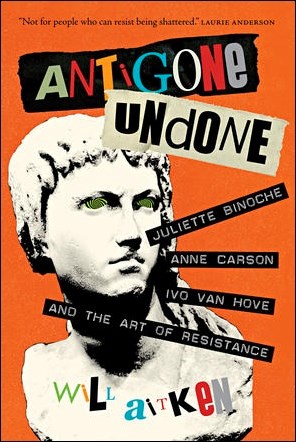By Will Aitken
Published by University of Regina Press
$24.95 ISBN 9-780889-775213
Great art can pick you up by the heels and shake the daylights out of you, and that’s what happened to novelist, travel journalist and film critic Will Aitken after he was invited to Luxembourg by Canadian literary phenomenon Anne Carson to sit in on rehearsals for (and the premiere of) Sophokles’s tragic Greek play, Antigone, which Carson had translated.
The experience undid Montreal’s Aitken, and in his book Antigone Undone, he unpacks this “ambush” and explores why the 2,500-year-old play has been profoundly affecting audiences since first produced.
Antigone Undone packs quite a punch itself. The hardcover is organized into three distinct parts and Aitken’s sassy style, subject knowledge and humanity illuminate each page. Antigone concerns an unhappy family (naturally). The title character is a teen princess who insists her battle-killed brother be buried, but her uncle, the king, insists he was a traitor and “his body must rot in the sun for all to see.”
When Antigone — played by my favourite, Juliette Binoche – throws dirt on the body, Kreon walls her in a tomb. But Antigone is no doormat. She doesn’t go down without a roar.
There is a whack of gender politics happening here, and it’s easy to find parallels between the princess’s struggles and what’s centre stage in the world today (#MeToo).
Of the play’s immediacy, Aitken says “Antigone opened my eyes to the constancy of human suffering and said to me, ‘Nothing changes, nothing ever will.’”
The book’s first section, in diary form, gives us a ringside seat to the rehearsals, plus insights into the book’s living cast — the play’s director (Ivo van Hove), Binoche, Carson (and husband Robert Currie) and Aitken. The section includes zippy candid emails between the author and Carson, his longtime friend.
The latter writes, “Currie loves Sondheim. It’s pretty fun, although Sondheim’s songs all sound the same to me and Meryl Streep’s teeth are depressing.” In short, this isn’t small talk, folks. These intellectuals use words like “belvedere,” “tenebrous” and “humis.” They hobnob with Juliette Binoche and use “Feist,” “Strauss” and “Judy Garland singing ‘The Man That Got Away’” in the same sentence.
But the suffering author also keeps it real, observing after one rehearsal, “I find myself thinking how little I know about acting, despite having watched and written about it for much of my life.”
He considers Binoche’s acting prowess. “I see a fearless woman on a ledge high above the sea, ready to hurl herself into the void, again and again if necessary.”
In Part II Aitken juxtaposes interviews with Binoche, Carson and van Hove, discussing their collaboration. The final section is more academic, with Aitken examining other writers’ (Woolf, Kierkegaard, Hegel) responses to Antigone.
Aitken’s real-world drama makes this book sing, especially the frank writing about his haunting post, Antigone time in Amsterdam, and his return to Canada, when “suicidal ideation arrive[d] like a hearse pulled up on the living room rug.”
Curtains rise and curtains fall, but the action on stage over centuries seemingly changes little.
— This book is available at your local bookstore or from www.skbooks.com




